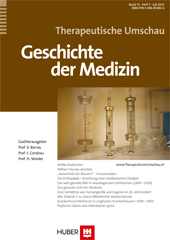„Ausserhalb der Mauern“ – Für eine neue Geschichte der Irrenanstalten in der Moderne
Abstract
Zusammenfassung. Wenn wir an Medizin, Wahnsinn und die Vergangenheit denken, so taucht unmittelbar ein Bild vor unseren Augen auf: dasjenige der Irrenanstalt. In der Nachfolge von Michel Foucaults berühmtem Buch Wahnsinn und Gesellschaft: Eine Geschichte des Wahns im Zeitalter der Vernunft haben viele Historiker angenommen, dass die Medikalisierung der Geisteskrankheit in der Moderne zu einem „grossen Einsperren“ geführt hat und zu einer verstärkten Absonderung aller angeblich geistig Untauglichen im „Zeitalter der Irrenanstalt“. Neuere Forschungen zeigen aber, dass diese klassische Erzählung der Psychiatrie-Geschichte revidiert werden sollte. Sie zeigt, dass es seit dem 19. Jahrhundert eine ganz andere medizinische Kultur gab, die die Irrenanstalt anzweifelte. Sie befürwortete die Integration der Wahnsinnigen und setzte sich dafür ein, dass sich die Psychiatrie vom dominierenden Modell der Internierung im ganzen Westen loslöste. Dieser Beitrag will die Resultate dieser historischen Arbeiten präsentieren und einen anderen Aspekt der Psychiatrie-Geschichte zeigen, nämlich die Praktiken des „boarding out“ anstelle derjenigen der Irrenanstalt.
Abstract. If one thinks medicine, madness and the past, one image immediately pops into mind: that of the mental asylum. Following the famous work by Michel Foucault, Madness and Civilization: A History of Insanity in the Age of Reason, many historians have thus considered that the medicalization of insanity in the modern age had mostly led to a “great confinement” and a greater segregation of all individuals deemed mentally unfit during the “asylum era”. However, new research demonstrates that this classic narrative of the psychiatric past needs to be revised. It discloses that, ever since the 19th century, a whole other medical culture existed as a challenge to asylums, a culture that advocated the integration of the mad and fought to disassociate psychiatry from the dominant model of confinement all throughout the occidental world. This article aims at presenting the results of these historical works that depict another aspect of the psychiatric history, exploring “boarding out” practices, instead of asylum ones.



